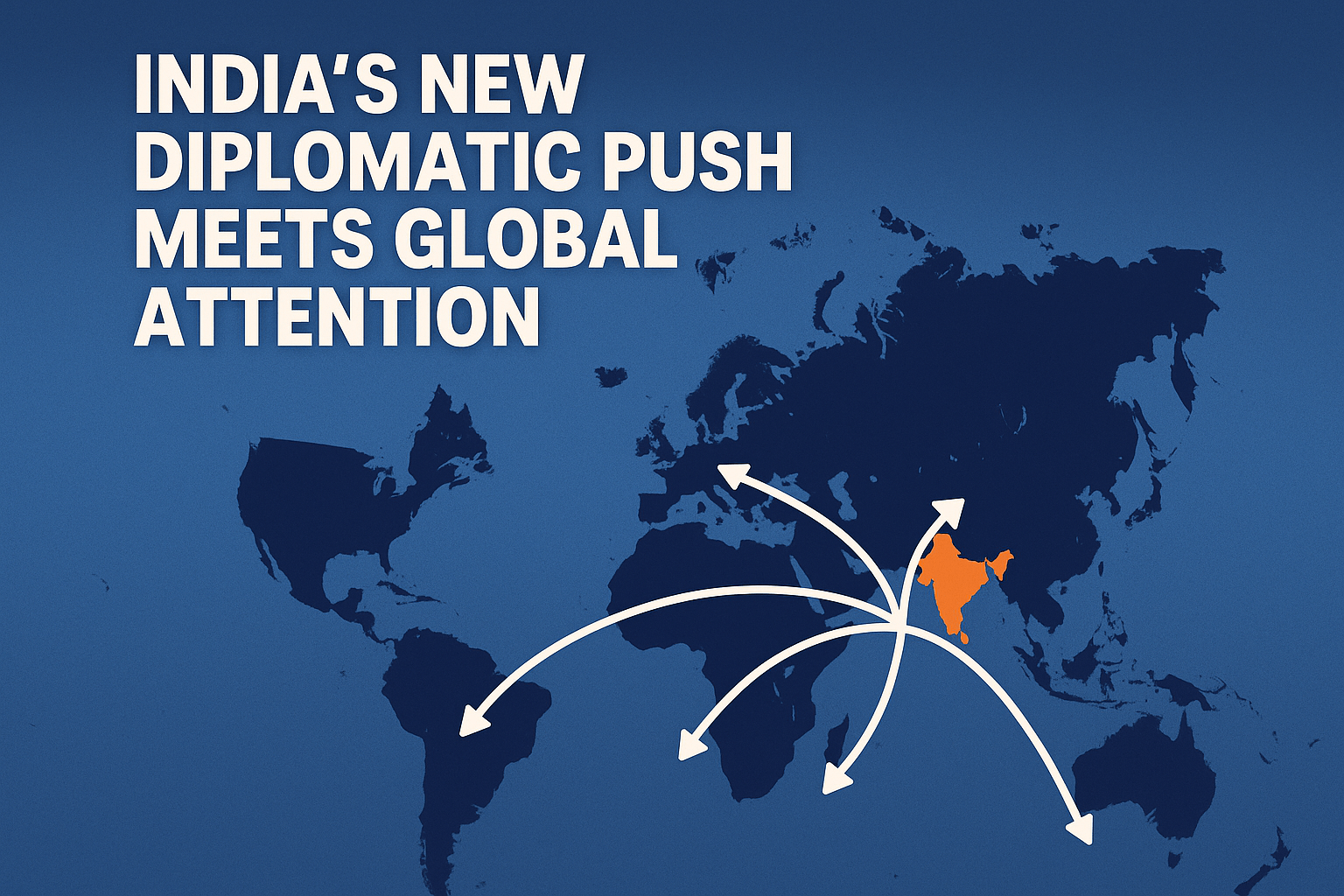 India’s Global Diplomatic Outreach Intensifies
India’s Global Diplomatic Outreach Intensifies
India, led by Prime Minister Narendra Modi, has launched an ambitious diplomatic campaign aimed at strengthening its global influence. The focus areas include counter-terrorism cooperation, boosting economic partnerships, and advancing the Indo-Pacific strategy to maintain regional stability. Recently, India held high-level meetings with top officials from the United States, France, Australia, and Japan, signaling its intent to deepen strategic ties amid rising geopolitical tensions. These diplomatic efforts also aim to counter negative international narratives about Kashmir, a persistent point of conflict with Pakistan and China. Analysts believe this outreach could elevate India’s stature on the world stage, especially within key global forums such as the G20 and BRICS. India’s diplomatic push comes at a time when it faces complex regional challenges, including border disputes with China and ongoing tensions with Pakistan. By fostering stronger international partnerships, India hopes to secure economic growth, ensure security cooperation, and promote its vision of a free and open Indo-Pacific. Experts note that this proactive diplomacy could help India balance regional power dynamics and project itself as a responsible global leader in the coming years.
✝️ Pope Leo XIV’s Inaugural Mass – A Historic Moment
Pope Leo XIV, formerly Cardinal Robert McElroy from the United States, delivered his first official mass as the new head of the Roman Catholic Church. The event was historic, drawing a global audience and attendance by influential figures such as U.S. Vice President JD Vance and Ukrainian President Volodymyr Zelensky. In his homily, Pope Leo emphasized themes of peace, inclusivity, and moral leadership, calling on the Church to act as a beacon of hope amid ongoing global crises. Many observers hope his leadership will revitalize the Church’s diplomatic engagement, particularly in conflict zones like Gaza and Ukraine, where religious diplomacy could play a key role in easing tensions. The new pope’s message resonated with calls for reconciliation and social justice, signaling a potential shift toward a more active role for the Vatican in world affairs. As the Church navigates contemporary challenges, Pope Leo XIV’s tenure is expected to blend tradition with modern diplomacy, aiming to unite diverse communities and advocate for global peace.
 Iranian Plot Against Journalists in the UK Foiled
Iranian Plot Against Journalists in the UK Foiled
British authorities thwarted a serious security threat when three Iranian nationals were arrested in London for plotting attacks on journalists affiliated with “Iran International,” a Persian-language news outlet critical of the Iranian government. The plot has heightened concerns over press freedom and the activities of Iranian intelligence networks operating covertly across Europe. The arrests come amid growing worries about the safety of diaspora journalists who face intimidation and violence due to their reporting on Iran’s political regime. In response, UK officials have tightened security protocols to protect vulnerable media personnel. This incident underscores the broader challenges Western democracies face in safeguarding freedom of expression while confronting covert foreign operations aimed at silencing dissent. It also highlights ongoing tensions between Iran and Western countries, where intelligence and security issues intersect with human rights and media freedom. Experts warn that such plots risk escalating diplomatic tensions and call for enhanced international cooperation to defend journalists worldwide.
 Pakistan Counters with Parallel Diplomatic Drive
Pakistan Counters with Parallel Diplomatic Drive
In response to India’s heightened diplomatic efforts, Pakistan has launched its own foreign policy campaign, spearheaded by Foreign Minister Bilawal Bhutto Zardari. Pakistan’s narrative focuses heavily on Kashmir, accusing India of promoting Hindu nationalism and portraying itself as a key player in combating extremism in the region. However, Pakistan’s diplomatic ambitions face significant hurdles due to the country’s ongoing economic crisis, which analysts say undermines its ability to sustain long-term diplomatic influence. The government aims to rally international support by emphasizing human rights issues in Kashmir and highlighting Pakistan’s strategic importance in regional security. Despite these efforts, global experts remain cautious about Pakistan’s campaign effectiveness, noting that economic instability and political turmoil may limit its global appeal. Pakistan seeks to counterbalance India’s growing global presence but must address internal challenges to improve its diplomatic standing. The evolving rivalry between India and Pakistan continues to shape South Asia’s geopolitical landscape, with both countries vying for influence on the world stage.
 Mali Suspends All Political Parties Amid Protests
Mali Suspends All Political Parties Amid Protests
Mali’s military-led government has taken a drastic step by suspending all political parties amid escalating protests demanding democratic elections. The move came after the interim president suggested extending his rule, triggering widespread public outrage. Demonstrations grew intense, with citizens calling for a swift return to civilian governance. The suspension has drawn sharp criticism from the United Nations and the African Union, both urging Mali’s leaders to respect democratic processes. Analysts warn this crackdown could deepen Mali’s slide into authoritarianism and worsen instability in the volatile Sahel region, which is already grappling with jihadist insurgencies and economic hardship. The political uncertainty threatens to derail peace efforts and international support programs aimed at stabilizing the country. Civil society groups fear the suspension will silence dissent and delay democratic reforms, potentially igniting further unrest. Mali’s future hinges on how the military balances security concerns with the demand for political freedoms amid growing domestic and international pressure.
 Tripoli Clashes Leave Dozens Dead
Tripoli Clashes Leave Dozens Dead
Libya’s capital Tripoli was rocked by fierce clashes between rival militia groups, resulting in dozens of deaths and significant civilian displacement. The fighting erupted over control of key neighborhoods and strategic locations, with artillery shelling residential areas, forcing thousands to flee their homes. After several days of intense conflict, a fragile ceasefire was brokered, but the underlying tensions remain unresolved. These clashes highlight Libya’s ongoing struggle to unify the country under a single, stable government after the fall of Muammar Gaddafi in 2011. The power vacuum has led to fragmented control by various militias competing for influence, undermining efforts toward national reconciliation. International actors have called for renewed dialogue and peacebuilding initiatives, warning that continued violence threatens Libya’s recovery and regional stability. Civilians continue to bear the brunt of the conflict, facing insecurity, disrupted services, and humanitarian needs as the political deadlock persists.
🕊️ U.S.–Houthi Ceasefire Agreement
The United States and Yemen’s Iran-backed Houthi rebels have agreed to a ceasefire in the strategically vital Red Sea region, brokered by Oman. The truce aims to protect maritime trade routes after months of attacks on commercial vessels, which threatened global shipping and increased tensions in the Middle East. Although the ceasefire marks a positive step toward reducing hostilities, it notably excludes Israeli targets, highlighting ongoing complexities and divisions in regional diplomacy. The agreement may pave the way for broader peace negotiations in Yemen, where a protracted civil war has caused severe humanitarian crises. Analysts view the ceasefire as a cautious but hopeful signal that dialogue and diplomacy can limit conflict escalation in the region. However, challenges remain, including internal divisions among Yemeni factions and broader geopolitical rivalries involving Iran, Saudi Arabia, and the US. The ceasefire’s sustainability will depend on continued diplomatic engagement and efforts to address underlying political grievances.

 Russia-Ukraine Peace Talks at a Standstill
Russia-Ukraine Peace Talks at a Standstill
New rounds of peace talks between Russia and Ukraine have ended without an agreement, prolonging the conflict that has devastated eastern Ukraine. Russia insists on retaining control over Crimea and other occupied territories, while Ukraine demands full restoration of its sovereignty and territorial integrity. The impasse has stalled diplomatic progress, even as fighting continues on the ground. In eastern Ukraine, clashes persist with heavy casualties reported, and drone attacks have escalated in Russia’s Belgorod region, adding to regional tensions. International mediators are urging both sides to return to negotiations, warning that continued conflict risks further destabilizing Europe’s security landscape. The stalemate highlights the deep divisions and uncompromising positions that complicate peace efforts. Meanwhile, humanitarian conditions worsen for civilians caught in the war zone, emphasizing the urgent need for diplomatic solutions to prevent further suffering and regional spillover.
📉 WHO: COVID’s Legacy is a Health Crisis
The World Health Organization (WHO) released a sobering report detailing the profound impact of the COVID-19 pandemic on global health. Between 2019 and 2021, global life expectancy dropped by an average of 1.8 years, with some regions in Africa and Southeast Asia experiencing declines of up to three years. The pandemic reversed decades of health progress, exposing weaknesses in healthcare infrastructure, disease prevention, and social support systems worldwide. WHO experts warn that the legacy of COVID-19 is not just in the immediate deaths but in a long-term health crisis, including increased chronic illnesses and mental health challenges. The report underscores the urgent need for substantial global investment in public health, stronger health systems, and preparedness for future pandemics. It also calls for equitable access to vaccines and healthcare services to address disparities that the pandemic has exacerbated. The pandemic’s lasting impact serves as a critical reminder of the interconnectedness of global health and the importance of solidarity in tackling health emergencies.



